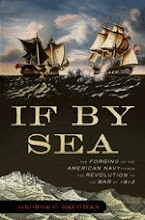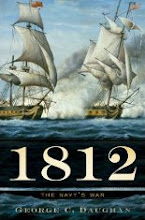If By Sea: The Forging of the American Navy--From the American Revolution to the War of 1812 is really two books. The first (through page 239) is a well-crafted military history of the American Revolution from Lexington and Concord to Yorktown with special emphasis on the role played by naval forces. The second (the next 235 pages) concerns the political argument between advocates and opponents of a standing peacetime American navy from 1783 through the end of America's second war with Britain in 1815. Author George C. Daughan ties these subjects together by showing how the United States struggled to decide what kind of naval force was appropriate to the new nations's needs: a blue-water navy on the British model or a defensive gunboat navy for harbor defense. His answer, curiously, is that the country made the wrong choices both during the Revolution and in the thirty-plus years afterward.
During the Revolution, Daughan contends, the Americans used the Royal Navy as a model to build a Continental navy that proved worse than useless, not only failing in its mission but also squandering scarce resources. It would have been far better, he argues, if the Revolutionary generation had opted for a swarm of row-gallerys that could have cooperated with General George Washington's army at Boston and New York. "The real problem," Daughan writes, "was not that the patriots could not produce an effective navy, but that they created the wrong kind" (p235). Then they did it again. Confronted with the danger of being drawn into the war in Europe after 1793, the United States relied on a gunboat navy when, Daughan insists, it should have been building blue-water warships.
The book has many strengths. Daughan is entirely successful in providing requisite background and context for events and issues. His history of the Revolutionary War is so thorough that a novice would have no trouble following both the events and the subsequent policy arguments. In addition to providing a vivid narrative of the sea actions, Daughan outlines land comapaigns to show how naval forces might have played a role. Moreover, this context includes insightful assessments of both American and British political and military decision makers.
Another strength is the prose itself, which is lively, even gripping at times. Daughan's thoughful introductions to the major historical characters quickly involve the reader in the narrative. And Daughan does not limit himself to the usual suspects. While he includes a sprightly account of John Paul Jones's 1779 fight with the HMS Serapis in the North Sea, he concludes that "suburb leaders," like Jones and others, "were wasted in largely meaningless, although at times spectacular and heroic, missions" (p.76). The British naval theater commander, Lord Richard Howe, who, according to Daughan, "carried out his orders selectively," plays a larger role in the story than does Jones (p.165).
In the second half of the book Daughan contributes to the ongoing rehabilitation of President John Adams, portraying him as both realistic and courageous (though Daughan has nothing but scorn for Thomas Jefferson, whom he depicts as not only averse to war but so horrified by the prospect as to behave cravenly). If Jefferson survived a French threat to Louisiana and a war with the Barbary powers. Daughan concludes, then it was becouse he was lucky rather than good. Daughan describes Jefferson as "pusillanimous" in his relations with Britian adopting a policy of economic coercion that "invited contempt" (p. 384). These passionate arguments invite a response and will perhaps reinvigorate the debate over Jefferson and early American naval policy.
Craig L Symonds
U.S. Naval Academy
AWARDS
"If By Sea" received the Samuel Eliot Morison Award from the New York Commandery of the Naval Order of the U.S. in New York City on November 3, 2008. The award is given every year to an "American author, who by his published writings shall have made a substantial contribution to the preservation of the history and traditions of the US Navy".
"If By Sea" has received an Honorable Mention for the prestigious 2009 Fraunces Tavern Museum Book Award. "The award is presented each year to the author of the best, newly published work on the American Revolutionary period, combining original scholarship, insight and good writing,......." The committee is also empowered to name additonal awards such as Honorable Mentions..... whenever they deem appropriate".
"If By Sea" has received an Honorable Mention for the prestigious 2009 Fraunces Tavern Museum Book Award. "The award is presented each year to the author of the best, newly published work on the American Revolutionary period, combining original scholarship, insight and good writing,......." The committee is also empowered to name additonal awards such as Honorable Mentions..... whenever they deem appropriate".
Best Seller Lists
#5 on the best seller list for the San Francisco Chronicle.
#8 on the best seller list for the Maine Sunday Telegram.
#8 on the best seller list for the Maine Sunday Telegram.
Review
"This is a book for those who like their history braced by serious thinking - and spiced by action. Goerge Daughan makes us realize just how complicated it was for Americans to acquire a navy - and keep one - for the first three decades of our national existence. Simultaneously he grips us with vivid narratives of what these mostly forgotten sailors accomlished."
Thomas Fleming, author of The Perils of Peace: America's Struggle to Survive after Yorktown.
Thomas Fleming, author of The Perils of Peace: America's Struggle to Survive after Yorktown.
Review
"If By Sea" illuminates the tangles and contested origins of American naval power better than any other book in recent memory. Daughan has a sharp eye for detail as well as a firm grasp of the big picture. His writing combines passionate conviction with a deep knowledge of seamanship in a way reminiscent of Samuel Eliot Morison. This is a book I will read again."
Edwin G Burrows, co-author of Gotham
Edwin G Burrows, co-author of Gotham
Review
"If By Sea by George C. Daughan covers the Navy's first forty years with authority, clarity and detail. He puts the famous names - John Paul Jones, Oliver Hazard Perry - in context, while bringing others - including dozens of Revolutionary War figures, hitherto unknown to me - to light. He shows how the military, like any other large organization, lurches and learns over time, from blunders, missed opportunities and general snafu, until those moments when the right men are at headquarters and in the field, and everything gloriously clicks."
Richard Brookhiser, author of George Washington on Leadership and What Would the Founders Do?
Richard Brookhiser, author of George Washington on Leadership and What Would the Founders Do?
More Reviews
Reviews are added below as they come in. In order not to be too repetitive many of the reviews are condensed.
New England Quarterly Review
"With If By Sea, George Daughan has written an informative and engaging work. No dry recitation of facts, Daughan's text is instead a fast-moving history of the birth and maturation of the embryonic U.S. Navy of the American Revolution. By interweaving the story of the navy's inception with the military and political dynamics of the era, Daughan has produced a unique and original work."
George W. Emery was appointed the 24th Commander of U.S. and Allied Atlantic Submarine Forces by President Clinton. Now retired, he served for nine years as a member of the Secretary of the Navy's Subcommittee on Naval History.
George W. Emery was appointed the 24th Commander of U.S. and Allied Atlantic Submarine Forces by President Clinton. Now retired, he served for nine years as a member of the Secretary of the Navy's Subcommittee on Naval History.
The Weekly Standard Review
Founders Afloat. "The fortunes of the nation and its navy" have always been linked
"In his first paragraph George Daughan quotes President John Kennedy's foreword for Naval Documents of the American Revoution. The words that Daughan selected to establish a premise for his own work were written by Kennedy to express the hope that the Naval Documents series would "make it amply clear the critical role played by sea power in the achievement of American Independence." "
"Daughan meets that challenge in absorbing detail, beginning with the intitial deployment in December 1775 of a Contintental Navy squadron against New Providence and continuing through scores of naval actions and ploitical disputes, both large and small. And to his credit, he avoids depicting naval actions as freestanding events, instead showing how they were more often than not linked to the land war."
Joseph F Callo is the author, most recently, of John Paul Jones: America's First Sea Warrior.
"In his first paragraph George Daughan quotes President John Kennedy's foreword for Naval Documents of the American Revoution. The words that Daughan selected to establish a premise for his own work were written by Kennedy to express the hope that the Naval Documents series would "make it amply clear the critical role played by sea power in the achievement of American Independence." "
"Daughan meets that challenge in absorbing detail, beginning with the intitial deployment in December 1775 of a Contintental Navy squadron against New Providence and continuing through scores of naval actions and ploitical disputes, both large and small. And to his credit, he avoids depicting naval actions as freestanding events, instead showing how they were more often than not linked to the land war."
Joseph F Callo is the author, most recently, of John Paul Jones: America's First Sea Warrior.
Boston Globe Review
Tracking a sea change in a nascent nation and its navy
".......it is in telling the story of its beginnings in the "guerrilla navy" of the Revolution that "If By Sea" willl have enduring innterest to naval history buffs."
Michael Kenney is a freelance writer who lives in Cambridge, Mass
".......it is in telling the story of its beginnings in the "guerrilla navy" of the Revolution that "If By Sea" willl have enduring innterest to naval history buffs."
Michael Kenney is a freelance writer who lives in Cambridge, Mass
The Star-Leger, Newark, NJ Review
"This superbly achieved intensely researched history of the U.S. Navy is, in a way, an enterprise in second-guessing - brilliant second-guessing - by a writer with the advantage of 200 years of hindsight."................
Tom Mackin served as a U.S. Navy correspondent in World War II. He lives in Lakewood, NJ.
Tom Mackin served as a U.S. Navy correspondent in World War II. He lives in Lakewood, NJ.
The Post and Currier, Charlestown, SC Review
" "If By Sea" is a commendable book in concept and accurately accounts for the development of the American Navy in the context of ongoing Revolutionary events. ................., this work is a praiseworthy addition to American naval history."
Ben Moise, is a writer who lives in Charleston, SC.
Ben Moise, is a writer who lives in Charleston, SC.
Maine Sunday Telegram Review
'Naval-gazing never so agreeable as in Portland writer's 'If By Sea'
'' 'If By Sea', a new book by Portland resident George C Daughan, is a sprawling fact-packed, generally successful attempt to chronicle the slow painful birth of what became the United States Navy.
"The reader must stand in awe of Daughan's command of specific glittering incidents and individuals in the context of his abiding overall knowledge of naval, military, political, economic and social developments across the Atlantic world from 1775 to 1815.
"Daughan, who earned his doctorate in history at Harvard University and taught history and government at various colleges (including the University of New Hampshire), is clearly steeped in his subject. He understands it fully, from naval personnel to the vessels themselves to the politics of supply and support. Indeed as the winds of revolutions blew through the 13 colonies (all of them maritime to some degree), sea fighting occurred.
" 'If By Sea' opens inevitably and appropriately on April 18, 1775, which we all know as "two if by sea" signaling Paul Revere and the rebels that the British were crossing ("by sea") the Charles River. Thus, from the first page, the reader sees how tightly Daughan cleaves to events that are not strictly blue water. The importance of British Admiral Graves' ambivalence and later attempts to get tough by burning Falmouth (now Portland) are part of the weave."
William David Barry - August 10, 2008
William David Barry is a local (Maine) historian who has authored/co-authored five books, including "Tate House:Crown of the Maine Mast Trade" and the novel "Pyrrhus Venture".
Booklist Review of "If By Sea"
"Improvised at the outset of the Revolution and neglected between 1783 and 1794, America's navy achieved respectability in the Barbary War, fame in the War of 1812. Concurrently, it was the object of a bitter political feud between the Federalists, who held that the central government needed to afford a navy, and the Democrats, who feared what having a navy and other established military forces might lead that government to do. Besides the battles and the politics, Daughan clearly recounts the evolution of American warship design (or acquisition) during the period covered and sketches a great many significant figures, including not only such household names as John Paul Jones and Stephen Decatur but also such equally capable officers as Nicholas Biddle and Richard Somers, killed in action before they could fulfill their promise, and such also-rans as Esek Hopkins, first commander of an American fleet, and Richard Dale. This stout tome wil probably stand for some time as the best single-volume history of the roots of the U.S. Navy."...........Roland Green
Kirkus Reviews
"Ambitious, painstakingly detailed account of how the fledgling American fleet grew into a permanent navy. Despite calls by George Washington and John Adams to raise a navel power, there was no muscular attempt to organize patriot sea militias at the outbreak of the Revolution, largely because the Royal Navy appeared so dominant. The rebels didn't realize, writes Daughan, former director of the Air Force Academy's MA program in international affairs, that their strength lay in their humble whaleboats. This is evident in the author's blow-by-blow re-creation of such early sea skirmishes as the overtaking of the British Margaretta by rebels off the coast of Machias, Maine, on May 24, 1775, a battle that James Fenimore Cooper later called "the Lexington of the sea." The Continental Congress could not adequately direct naval strategy, while the heroic efforts of patriot seamen like John Paul Jones, John Barry, Lambert Wickes and Nicholas Biddle were squandered on insignificant missions.The French alliance helped turn the tide, but what remained of the Continental Navy played little part in the momentous victories, and the new republic was too broke to fund a navy. Goaded by high-seas piracy and impressments and seizure by the English, Congress eventually passed the Naval Act of 1794, which authorized the construction of a half-dozen frigates-"a pathetically smallforce," notes Daughan. President Adams was determined to bolster defense measures, but his successor was unwilling to expend public funds for defense; Jefferson preferred to use the power of commerce as a foreign-relations weapon. The issues of impressment and trade grew increasingly contentious between America and Britain, culminating in the declaration of war by President Madison in 1812. The author demonstrates how American privateers effected some surprising victories, contributing to the growing consensus that the navy was indeed critical to the nation's defense. Not just a rigorous, steady-going chronological history, but also a cogent analysis of the genesis of a defense strategy."
Publishers Weekly
"Daughan brings a long academic career and solid command of his sources to this provocative history of the origins of the U.S. Navy. Conventional wisdom has the navy beginning in the 1790's. Daughan instead traces its roots to the Revolution. The fleet established by the Continental Congress had a relatively undistinguished career, but Daughan demonstrates that the Americans gained technical experience, produced talented officers, trained seamen and developed a basic understanding of how a navy should be employed. The question then was whether a navy would concentrate too much authority in the central government and risk embroiling the new country in foreign quarrels. By contrast, a coastal defense force of small ships threatened nobody, foreign or domestic. Daughan traces the debate through four administrations, smoothly integrating political with external influences like the Quasi-War with France (1798-1800) and the campaign against the Barbary pirates. Not until the War of 1812, when the navy proved critical did a national consensus emerge that preparing for war was the best way of avoiding one - a lesson that remains worth rememering. "
Subscribe to:
Posts (Atom)


